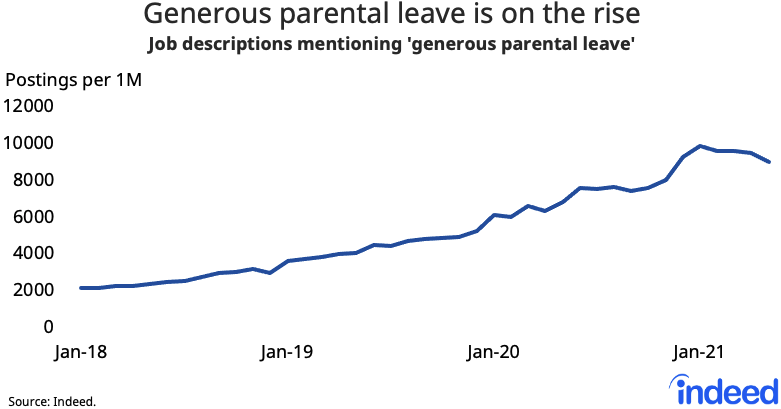The number of jobs offering generous and extended parental leave has risen by 201% in the past three years1, according to new research*.
While employers are legally obliged to give new parents paid leave, an ever-increasing number of job descriptions mention staff benefits over and above the statutory minimum. The number of vacancies advertising an enhanced parental leave package is now three times higher* than it was three years ago.
Since Covid-19, fathers nearly doubled the time they spent on childcare2 and there are signs that some companies are actively encouraging fathers to take a break to spend time with their baby. Indeed found that postings mentioning shared parental leave have risen by 206% since 20182.
In the UK, Statutory Maternity Leave lasts up to 52 weeks with statutory pay covering the first 39 weeks. By contrast, Statutory Paternity Leave lasts just two weeks. Since 2015, couples have been able to share up to 50 weeks of leave and up to 37 weeks of pay if they take shared parental leave3.
New mothers receive 90% of their average weekly earnings in statutory pay for the first six weeks after their baby is born, followed by £151.97 a week (or 90% of pay if that is lower) for the next 33 weeks. However, many companies are going above and beyond that3.
The retailer Boots, which tops Indeed’s list of companies with the most job postings mentioning generous parental leave, offers enhanced maternity pay for staff.
All employees at BMI Healthcare, which is second on the list, offers up to 52 weeks maternity and adoption leave paid in full for the first 13 weeks. For paternity leave, it offers two weeks at full pay.
Employees at Vodafone, which is fifth on the list, are offered 16 weeks of fully paid parental leave while civilian members of staff meeting certain conditions at the Ministry of Defence, the highest ranked public sector employer, receive 100% of their salary during the first 26 weeks of Ordinary Maternity Leave (OML).
Indeed’s maternity pay benefit for mothers, or eligible employees, in the UK is 100% of their base weekly earnings for 26 weeks — the full duration of OML — and six weeks paid time off for fathers and secondary caregivers to spend with their new addition.
Analysis of the companies most likely to highlight ‘generous parental leave’ benefits in their job postings show a wide variety of sectors, including retail and healthcare.
Toon
Paid leave programs can increase loyalty felt by workers and help with retention and reduce turnover. These help businesses avoid the cost of having to hire and train employees to replace those who leave to care for new children.
Stronger family bonds
Research shows that time off for fathers and secondary caregivers can help improve relationships at home. According to McKinsey, men on paternity leave noticed an improvement in their relationship with their partner while leave can help bring about strong relationships with children over time.
Boosts equality in the workplace and at home
Paid leave makes it easier for women to stay in the workforce after welcoming a new child to the family and boost female labour market participation. Fathers and secondary caregivers taking parental leave also tips the balance of household tasks away from mothers who traditionally have performed these.
Paul Wolfe, Senior Vice President of Global Human Resources at global job site Indeed, comments: “Becoming a parent for the first time, or growing your family, is an exciting and precious time. But it’s also the hardest job going. New parents often need to adapt to a whirlwind of change and emotions, which is why the best parental leave programs are designed to give families the support they need during those important first months of parenthood.
“It’s encouraging to see a growing number of companies, in a wide variety of sectors, go above and beyond to give their employees enhanced parental leave but employers must also remember that parenting does not stop once their employee returns from leave.
“Paid leave programmes help improve a person’s wellbeing and when an employee is happy and feels appreciated it has a positive knock-on effect on their productivity and loyalty.
“For employers, it’s important that programs are inclusive and to understand that there are many different types of families in your workplace when ensuring whoever is the primary caregiver has time with their newborn.”









